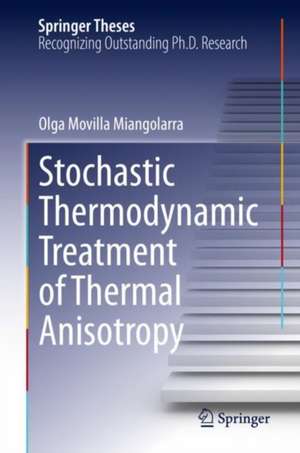Stochastic Thermodynamic Treatment of Thermal Anisotropy: Springer Theses
Autor Olga Movilla Miangolarraen Limba Engleză Hardback – 27 sep 2024
Din seria Springer Theses
- 18%
 Preț: 997.88 lei
Preț: 997.88 lei -
 Preț: 389.88 lei
Preț: 389.88 lei - 15%
 Preț: 646.94 lei
Preț: 646.94 lei - 18%
 Preț: 943.43 lei
Preț: 943.43 lei -
 Preț: 399.29 lei
Preț: 399.29 lei - 18%
 Preț: 944.99 lei
Preț: 944.99 lei - 15%
 Preț: 636.80 lei
Preț: 636.80 lei - 18%
 Preț: 941.05 lei
Preț: 941.05 lei - 15%
 Preț: 643.16 lei
Preț: 643.16 lei - 15%
 Preț: 642.68 lei
Preț: 642.68 lei - 18%
 Preț: 1103.62 lei
Preț: 1103.62 lei - 20%
 Preț: 558.83 lei
Preț: 558.83 lei - 18%
 Preț: 1112.30 lei
Preț: 1112.30 lei - 18%
 Preț: 944.19 lei
Preț: 944.19 lei - 18%
 Preț: 1109.92 lei
Preț: 1109.92 lei - 18%
 Preț: 1217.27 lei
Preț: 1217.27 lei - 15%
 Preț: 640.06 lei
Preț: 640.06 lei - 15%
 Preț: 636.45 lei
Preț: 636.45 lei - 15%
 Preț: 640.06 lei
Preț: 640.06 lei - 15%
 Preț: 640.88 lei
Preț: 640.88 lei -
 Preț: 389.70 lei
Preț: 389.70 lei - 20%
 Preț: 563.91 lei
Preț: 563.91 lei -
 Preț: 393.35 lei
Preț: 393.35 lei - 15%
 Preț: 637.93 lei
Preț: 637.93 lei - 15%
 Preț: 641.85 lei
Preț: 641.85 lei - 18%
 Preț: 1225.94 lei
Preț: 1225.94 lei - 20%
 Preț: 551.36 lei
Preț: 551.36 lei - 18%
 Preț: 1229.10 lei
Preț: 1229.10 lei - 15%
 Preț: 639.25 lei
Preț: 639.25 lei - 18%
 Preț: 999.45 lei
Preț: 999.45 lei - 15%
 Preț: 640.06 lei
Preț: 640.06 lei - 18%
 Preț: 1220.45 lei
Preț: 1220.45 lei - 18%
 Preț: 1116.26 lei
Preț: 1116.26 lei - 18%
 Preț: 1110.72 lei
Preț: 1110.72 lei - 18%
 Preț: 1000.87 lei
Preț: 1000.87 lei - 18%
 Preț: 891.17 lei
Preț: 891.17 lei - 15%
 Preț: 640.06 lei
Preț: 640.06 lei - 5%
 Preț: 1154.07 lei
Preț: 1154.07 lei - 15%
 Preț: 635.96 lei
Preț: 635.96 lei - 15%
 Preț: 640.88 lei
Preț: 640.88 lei -
 Preț: 387.20 lei
Preț: 387.20 lei - 18%
 Preț: 1109.92 lei
Preț: 1109.92 lei -
 Preț: 385.25 lei
Preț: 385.25 lei -
 Preț: 385.25 lei
Preț: 385.25 lei - 18%
 Preț: 1112.30 lei
Preț: 1112.30 lei - 18%
 Preț: 999.45 lei
Preț: 999.45 lei -
 Preț: 386.99 lei
Preț: 386.99 lei - 15%
 Preț: 637.13 lei
Preț: 637.13 lei - 20%
 Preț: 554.21 lei
Preț: 554.21 lei - 20%
 Preț: 555.59 lei
Preț: 555.59 lei
Preț: 633.47 lei
Preț vechi: 833.50 lei
-24% Nou
Puncte Express: 950
Preț estimativ în valută:
121.23€ • 126.10$ • 100.08£
121.23€ • 126.10$ • 100.08£
Carte tipărită la comandă
Livrare economică 10-16 aprilie
Preluare comenzi: 021 569.72.76
Specificații
ISBN-13: 9783031680656
ISBN-10: 3031680650
Pagini: 190
Ilustrații: Approx. 190 p.
Dimensiuni: 155 x 235 mm
Ediția:2024
Editura: Springer Nature Switzerland
Colecția Springer
Seria Springer Theses
Locul publicării:Cham, Switzerland
ISBN-10: 3031680650
Pagini: 190
Ilustrații: Approx. 190 p.
Dimensiuni: 155 x 235 mm
Ediția:2024
Editura: Springer Nature Switzerland
Colecția Springer
Seria Springer Theses
Locul publicării:Cham, Switzerland
Cuprins
Chapter 1: Introduction to Optimal Mass Transport.- Chapter 2: Introduction to Stochastic Thermodynamics.- Chapter 3: Stochastic thermodynamic systems subject to anisotropic fluctuations.- Chapter 4: Energy harvesting from anisotropic temperature fields.- Chapter 5: Minimal entropy production in anisotropic temperature fields.- Chapter 6: Application: thermodynamic engine powered by anisotropic fluctuations.- Chapter 7: Conclusion.
Notă biografică
Olga Movilla Miangolarra graduated from the Escola d’Enginyeria de Barcelona Est (EEBE-UPC) in 2018 with a B.S. in Mechanical Engineering. In 2018, she was awarded the Balsells Fellowship to pursue graduate studies in Mechanical and Aerospace Engineering at the University of California, Irvine. In 2023, she completed her PhD, focusing on the intersection between control theory and stochastic thermodynamics, under the supervision of Distinguished Professor Tryphon Georgiou and supported by the esteemed la Caixa fellowship. Currently, she is a postdoctoral researcher at the University of California, Irvine, and has been awarded the prestigious Marie Skłodowska-Curie scholarship to study open quantum systems at the Universidad de La Laguna, Spain.
Textul de pe ultima copertă
This thesis advances our understanding of how thermal anisotropy can be exploited to extract work through a mechanism that is quite distinct from the classical Carnot heat engine. Anisotropy, the presence of thermal or chemical gradients, is ubiquitous in the real world and powers the cascade of processes that sustain life. The thesis quantifies, for the first time, the maximum amount of power and efficiency that a suitable mechanism (a Brownian gyrator) can achieve in such conditions. An important contribution at the center of the thesis is to lay out a geometric framework that brings out the importance of an isoperimetric problem to analyze and quantify optimal operation of thermodynamic engines that harvest energy when simultaneously in contact with several heat baths. Fundamental bounds are derived via isoperimetric inequalities which capture the trade-off between work and dissipation that accrue during thermodynamic cycles. A geometric theory that allows such insights is explained first – the theory of optimal mass transport – followed by rudiments of stochastic thermodynamics that allow for quantification of work and entropy production during finite-time thermodynamic transitions. The thesis further explores entropy production due to heat flowing between heat baths of different temperature through the system dynamics, and concludes with analysis as a proof-of-concept of an autonomous engine that harvests energy from a thermal gradient to continuously produce work in a stable limit cycle operation.
Caracteristici
Nominated as an outstanding PhD Thesis by the University of California, Irvine Begins with an accessible introduction to optimal mass transport Presents a geometric framework to quantify the performance of thermodynamic engines under anisotropic fluctuations
